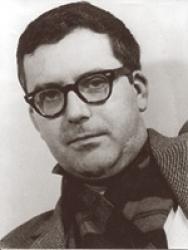Crisis of Creativity
 Photo of Michael Ende taken around the time that he became interested in Brecht
Photo of Michael Ende taken around the time that he became interested in BrechtIn 1955 Strindberg’s plays inspired Ende to write the drama Die Hässlichen (The Ugly, unpublished play). Soon afterwards he suffered his first grave literary crisis. It was sparked by his reading of Brecht’s theories about art and the theatre, in particular ‘Short Organum’, which left a big impression on him. During his studies at the Otto Falckenburg academy Ende had been given ‘a very minor role’ in a Munich production of Mother Courage and had experienced the playwright in action. He found his literary hero difficult to like: ‘I have never known a director to treat his actors so despicably. He bullied the cast, and didn’t see fit to provide the customary case of beer on the first night. He refused to speak to the lesser members of the cast - a task best left to his gaggle of twenty or so assistants. Needless to say, we were fascinated by him. He used to leave his clapped-out old car outside the theatre, so we lifted the bonnet and found a brand new Mercedes engine underneath. His working-class image was obviously just for show. When he won the Stalin Prize, he even asked for the money to be paid into a Swiss account.’
Despite his antipathy to Brecht as a person, Ende remained in thrall to his ideas and was convinced that Brechtian dramaturgy was the only viable way.
Ende’s intellectual engagement with Brecht’s theories led him to a creative impasse. In 1985 he spoke of his literary crisis during a forum event with Joseph Beuys: ‘The trouble was that I’d spent several years getting to grips with Brecht’s writings. I was young at the time and got caught in the web of his arguments. I fell for his theories and took them on face value. I honestly believed that he adhered to them. It took me a good deal of reflection to realize that he barely kept to them at all.’
In Brecht’s view literature and theatre served to ‘indoctrinate’ the reader or viewer and bring about socio-political enlightenment. Michael Ende found this approach unacceptable, for it presupposed a teacher-pupil relationship between the author and his readers. Ende was far from certain that his readers needed enlightenment or were any less intelligent or educated than he was: ‘I work on the assumption that my readers are at least as smart and enlightened as me. What would I be able to teach them? For the moment I’m happy just to entertain them. I invite my readers to join me in a kind of game. If they accept the invitation, they might find the experience enriching - and sometimes, if the text is good enough, it might make them happy. I certainly wouldn’t want them to feel ashamed of themselves for laughing and crying at my work - I invited them to take part in the game, and although it may have shaken them up a little, they’ll emerge again with a freshly swept soul...’